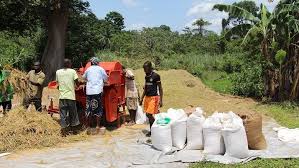-The key to inclusive Socio-economic Growth in Liberia
BY Sen. Victor Watson
Victor Varney Watson is Senator for Grand Cape Mount County and Chairman, Liberian Senate Standing Committee on Agriculture, Fisheries and Forestry. The commentary represents the opinion of the writer and does not necessarily represent the Liberian Senate or the Senate Committee on Agriculture.
After more than eight months without an Agriculture Minister, on February 5, 2020 a major transition set in; the Senate committee held confirmation hearing for a nominee with strong institutional and sustainable reforms experience in the private sector and the United Nations system.
Funding for smallholder farmers, Disease Control Regulations and food security through innovation were three critical concerns for which the committee members sought answers from the Minister of Agriculture.
These concerns can be summarised: there should be no “business as usual.” As Senator for Grand Cape Mount County, business as usual poses a farming risk to local farmers and impact productivity and sustainability.
Agriculture is an important sector of our economy. The Green and Blue economies are highly dependent on the climate. Increases in temperature and carbon dioxide (CO2) can increase some crop yields in some places.

But to realize these benefits, nutrient levels, soil moisture, water availability, and other conditions must also be met. Because these conditions have not been met in the past, it affected our food security in both urban and rural counties.
For Liberia to meet its target for ending hunger, achieving food security as stated in the United Nations Sustainable Development Goals (SDG 2) for the year 2030, three things must be considered.
Firstly, the current tax regime impacts cost of production for smallholder farmers, affecting not only food security and affordability but also storage, thus much food goes to waste. From the export perspective, we’ve become less competitive on the market, and locally farmers continue to struggle to gain competitive edge. The system discriminates against smallholders without farm storage.
We need more research that will effectively help guide policy development. We are developing polices too much on emotion than science. Incentivising the agriculture sector through innovative approaches, efficiency and technology would go a long way to help us become food secure.
Secondly, Disease Control Regulations are of paramount concern to farmers. Case in point was the impact of army worm’s invasion in Bong, Gbarpolu and Grand Gedeh Counties. A system where risk is minimised and returned on local farmers’ increase is what I look forward to. Our farmers need reassurances that as they farm, due diligence on funding and investment opportunities will be available to support them.
While the 2020 Tourism Authority Act undergoes debate, we’re reminded of the true potential of sustainable tourism is food security, particularly in leeward counties with Natural attractions.
Currently, Liberia lacks a National Food Sustainability Index. Reasons include the lack of development of sustainable agriculture and poor nutritional models.
However, according to the Food Sustainability Index 2017, a global benchmark for change which policymakers can use to analyze the relationship between food and scientific, economic, social, and environmental factors. Sub-Saharan Africa inclusive of Liberia fares particularly badly in the food loss and waste pillar, thereby increasing economic inequality.
Since the executive is responsible for implementation, the new Agriculture Minister needs to look at what has worked and what hasn’t; and make decisions based on scientific evidence to move forward on the path towards sustainably feeding our growing population.
It is crucial for not only those in the legislature or appointed by the executive to get involved in the conversation surrounding agriculture policy and regulations. Agriculture consumers should also get involved by writing your Lawmakers in the Legislature to voice a concern over agriculture policy issues.
Thirdly, any investment in agriculture or policy committee, must have a strong local farmer presence and the funding must better align with Liberia’s pro poor agenda and the need of leeward counties. Also, from a nutritional perspective, both the ministry of Health and Agriculture need to work together and develop Liberia’s food guidelines to ensure the children of Liberia have balanced diet. The ministry of education needs to work and ensure students maintain a healthy diet at home and school.
Agriculture reforms should not be touted as old wine in a new bottle, we must begin to build capacity to heal the distress our farmers encounter every day.
The time is now, and agriculture must come at the fore of the national development agenda, if not entirely then to some extent, so that the missing links in policy adoption at the legislature will be develop and back appropriate research. As Liberia agriculture makes a transition, strengthening resilience for food security and nutrition is the key to inclusive socio-economic growth and are prerequisite for building peace and reducing poverty.

